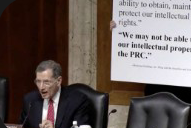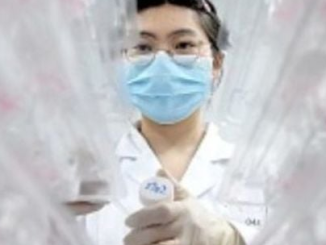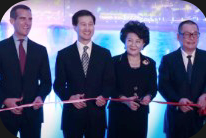
Senators grilled the Department of Energy over a $200 million grant to a China-based lithium battery company during a hearing on Thursday, as department officials admitted they are still conducting a “due diligence review” of the business months after announcing the award.
The DOE’s testimony to the Senate Energy and Natural Resources Committee on Thursday comes as the DOE has faced scrutiny from lawmakers over the proposed grant to Microvast, after the Washington Free Beacon reported on financial records that revealed the company’s operations are primarily based in China and the Chinese government “exerts substantial influence” over its business activities.
Sen. John Barrasso (R., Wyo.), the ranking Republican on the committee, brought a large placard to the hearing that quoted from Microvast’s Securities and Exchange Commission report, in which the company disclosed its extensive involvement in China.
“The company states, and it’s right here on the board behind me, that it is under the ‘substantial influence’—the ‘substantial influence’—of the People’s Republic of China, the PRC,” said Barrasso, noting that the term “PRC” was “mentioned 471 times in the company’s filings.”
“Did anyone at DOE actually do their homework?” Barrasso asked. “Did you know if anyone actually bothered to read this?”
The DOE grant program is funded by the Bipartisan Infrastructure Law, which included specific provisions from Congress to prevent federal funds from going to China’s battery industry. The DOE has defended the award, saying that Microvast is a “majority U.S.-owned company, traded on NASDAQ,” and “headquartered in Stafford, Texas.”
The committee’s chairman, Sen. Joe Manchin (D., W.Va.), told DOE deputy secretary David Turk that the committee has “some concerns” about Microvast and asked about the “DOE’s process for vetting applicants to ensure that we’re not giving our best ideas to China and funding them to be able to take advantage of it in their marketplace, along with ours.”
Turk said that Microvast hasn’t yet received the money and that the grant is still in the negotiation process. He said the DOE is working with U.S. intelligence agencies to conduct an “extended due diligence process” of all grantees, including Microvast.
Turk also noted that finding battery companies without extensive ties in China was a challenge.
“Unfortunately … the vast majority of battery manufacturing is in China right now. And a lot of that [intellectual property] is in China right now,” said Turk.
Barrasso, who last month sent a letter to the DOE asking for more details on the grant, said he was concerned about the department’s response, which stated that the DOE was carrying out a “thorough post-selection, risk-based, due-diligence review.”
“Makes you wonder why we don’t make those [determinations] before, as opposed to after the decision,” said Barrasso. “Why wouldn’t we assess the risk before making a grant decision on something like this?”
* Article from: The Washington Free Beacon


